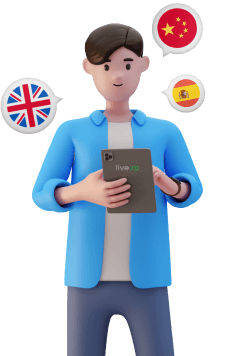
English for Hospitality: Why Your Staff Must Speak English
Good English is not only crucial for external communication with the guests. It is just as important for internal communication.

Get a FREE guide!
Want to sound like a native English speaker?
Get our free PDF with top tips that work.

Check your email!
If you’re a hotel owner, you certainly don’t want to be limited to serving local guests. The world has become small as people are traveling more than ever. The number of foreign tourists—and workers—is not going to decrease anytime soon. To enjoy all the benefits of having a hotel in 2024, it is not enough that you’re fluent in English. All your employees need to be fluent as well.
Why your staff needs hotel English training
Running a hotel is a serious business, and it’s a global one. If you want international guests or you’re considering hiring foreign workers from a country that is known for its hospitality, something needs to be done. There is one thing that can improve your staff’s productivity, internal communication, and customer service—all at once. It is the knowledge of English.
Employees in this field normally talk to guests every day, and they must offer great service. They need to really get where the customers are coming from and be able to handle their questions and concerns effectively. Since English is the go-to language worldwide, even if visitors don’t speak it fluently, they expect to use it in communication with the hotel staff.
To avoid a communication gap with your guests, any team members who aren’t strong in English need to take hospitality-focused English lessons. LiveXP corporate language training offers just that. It is a convenient, scalable, and affordable solution for your business.
Imagine managing everything with a single subscription but not wasting any money. If an employee skips a lesson, you get it back on your balance. Even better, these lessons never expire, and they can be used at some other time.
Importance of everyday English for hospitality professionals
External and internal communication
Good English is not only crucial for external communication with the guests. It is just as important for internal communication. Unless all of your employees are locals who speak the same language, communication between them would be very challenging unless they are all able to talk in English.
If your hotel operates as a part of a global chain, it’s even more important that your staff speaks English well. This helps in dealing with guests worldwide and in working with international partners. Good English allows for clear communication and ensures quality services provided by your hotel.
Staff’s confidence
Knowing English well can also boost your hotel staff’s confidence. When employees feel comfortable speaking English, they are more likely to interact confidently with guests from different countries. This confidence can make them more eager to help and provide top-notch service. They’ll feel prepared to handle various situations, from simple check-ins to addressing complex guest requests.
Moreover, this confidence can motivate your team to go above and beyond in their roles. They’ll take pride in their ability to communicate effectively, leading to a more positive work environment. Employees who are confident in their language skills are often more enthusiastic and committed to ensuring guests have a memorable stay at your hotel.
Hotel’s success
If your hotel’s staff speaks English, it proves that a high level of service is provided. Foreign guests are more likely to choose your hotel if they can communicate without gaps, and all their requests will be fulfilled.
Thus, knowledge of English is a serious plus and sometimes even a mandatory requirement for specialists in the hotel industry. Yes, it is necessary to spend time and money on its study, but all expenses are reasonable and pay off many times over.
Consider corporate English training for your team. Choose one that will help you increase global cooperation and support your hotel’s success. Keep your employees motivated by enabling them to learn English from a variety of tutors. Give them a choice to choose people who match their individual learning styles. You can do that with a single subscription to LiveXP.
English resources for tourism & hospitality online
There have never been so many resources available on the internet. Here are some popular solutions and their pros and cons.
ESL (English as a second language) conversation websites
Several popular ESL websites offer a variety of learning materials, including interactive lessons that mimic real-life interactions guests might have with staff. This practical approach to learning can help employees become more fluent and confident in their use of English.
However, these sites may be insufficient in hospitality-specific contexts such as greeting guests, handling reservations, and dealing with inquiries. Some websites may not offer content tailored to the specific needs of hospitality employees, focusing instead on general English skills.
Corporate English training program on LiveXP
In contrast, private lessons on LiveXP offer a more personalized learning experience. A dedicated tutor (or tutors) can tailor lessons to the specific needs of each member of your hotel staff, focusing on hospitality-related vocabulary and scenarios. Live tuition also allows for flexible scheduling around the employee’s work commitments, providing a more convenient and focused learning environment.
What company gets in this training:
- Personalized approach to teaching. Your employees can choose any tutor on the platform, depending on their interests, current English level, and other personal preferences.
- Tracking progress. Your HR manager or hotel owner can track every employee’s progress to see the results of your investment.
- Personal manager. You will get a personal assistant to help you with onboarding, payments, and other questions that may arise.
- LiveXP features and tools for a smooth learning experience. Lesson notes help write down all essential information during the lessons to get back to it later. All unknown words can be translated and added to the learning list with the help of Vocabulary on LiveXP. Word Trainer will help you learn these words in the most effective way—with a spaced repetition method.
- Change tutor at any time or learn with several ones. The LiveXP subscription doesn’t “tie” you to a specific tutor. You can switch to another one whenever you want or even learn with several tutors for better results.
Find out more about the advantages of using LiveXP for corporate language training and choose the most convenient platform for your employees!
Professional English resource sites
Business English websites are designed to help people learn English for work. For hotel staff, these websites are very useful because they teach words and phrases that are often used in hotels, like how to talk to guests, write formal emails, and solve problems. This means employees can learn exactly what they need for their jobs, making it easier for them to do their work well and help guests.
One good thing about these websites is that they focus on teaching English, which people use at work every day, and different ways to be polite and respectful, which is very important in hotels. However, these websites typically don’t offer personal help or practice in speaking. Even though there are many lessons and activities, there is no teacher to correct mistakes or give advice.
Online ESL courses
Courses on websites like Coursera give hotel staff a good way to learn English. These courses have videos, reading exercises, and activities made by experts. This can help your staff talk better with guests, manage bookings, and solve problems in English.
But, these online courses might not give quick help or answer questions right away. They are flexible but can feel less personal because people study alone. Also, they might not cover every specific thing hotel workers need to know.
YouTube videos showcasing hotel communications
YouTube has many videos that can help hotel staff learn English. These videos cover topics like greeting guests, handling bookings, and solving guest problems. Watching these can make learning fun and practical. Staff can see real conversations and learn how to use English in their jobs.
Even though it is a great resource, YouTube videos can’t cover everything a hotel worker needs. Yet, watching them can still be a good start. They can make learning interesting and give your employees a peek into how to use English at work. For the best results, they should mix YouTube learning with other ways, like live lessons with LiveXP teachers, who offer undivided attention to each member of your staff.
Books, Movies, and TV
ESL textbooks have always been great resources for learning English. They start with easy words and sentences and then introduce more difficult ones. This helps hotel staff learn how to talk to guests and solve problems step by step. But books also have an obvious flaw: they can’t talk. To fully acquire the information from the books, your staff needs dedicated tutors from LiveXP. A tutor can explain things they don’t understand and help them practice speaking, too.
Watching movies and TV shows in English is another good way to learn. They show you how people use English in real life, including the words they use when they’re happy, sad, or need something. This can be really useful for understanding guests better. But movies and TV shows can’t correct your employees’ mistakes. A private tutor can listen to them speak and help them improve.
Using books, movies, TV shows, and online resources together can really help hotel staff learn English. However, adding one-on-one lessons with a LiveXP English tutor makes learning even better. The tutor can give them personal attention, answer their questions, and help them practice speaking. This way, they get the best of both worlds: learning on their own and getting help from an expert.
English tourism and hospitality vocabulary
Knowing the right words makes it easier to welcome guests, help them with their needs, and make sure they have a great stay. Here are some useful phrases for hospitality workers, along with some explanations and tips on how to use them.
To get the most out of the phrases and sentences on this list, use them in pretend play with your LiveXP tutor and note them down in the Word Trainer feature in the app.
- Welcome to [Hotel Name]!—A warm greeting to make guests feel at home.
- How may I assist you?—A polite way to ask how you can help.
- Do you have a reservation?—To check if the guest has booked in advance.
- Could I have your name, please?—Asking for the guest’s name in a polite way.
- Here is your room key.—Giving the guest their key.
- Your room number is...—Telling the guest where their room is.
- What time is breakfast served?—Guests might ask this to know when they can eat.
- The elevator is to your right.—Directing guests on where to go.
- Would you like help with your luggage?—Offering to carry guests’ bags.
- Is there anything else I can do for you?—Asking if the guest needs more help.
- Enjoy your stay!—A friendly wish for the guest’s visit.
- Thank you for choosing [Hotel Name].—Showing appreciation to guests.
- Our Wi-Fi network is...—Providing internet details.
- The password for the Wi-Fi is...—Giving the Wi-Fi password.
- How was your stay with us?—Asking guests about their experience.
- Would you like to check out now?—Asking if the guest is ready to leave.
- Can I arrange a taxi for you?—Offering to get a taxi for the guest.
- Please sign here.—Asking guests to sign a document.
- Your bill total is...—Telling the guest how much they need to pay.
- Do you need an extra bed or crib?—Offering additional sleeping arrangements.
- Our gym/swimming pool is on the... floor.—Informing guests about facilities.
- Breakfast is included.—Telling guests their meal is part of the booking.
- Please do not hesitate to call reception if you need anything.—Encouraging guests to ask for help.
- This way to the conference rooms.—Directing guests to meeting areas.
- We have a 24-hour room service.—Informing guests they can order food anytime.
- Please use your room card for access.—Explaining how to use the room key for entry.
- Let me show you to your room.—Offering to take the guest to their room.
- Our restaurant is open until 10 PM.—Telling guests when they can eat.
- Thank you for staying with us. We hope to see you again.—A kind goodbye to guests.
- Can I confirm your booking details?—Double-checking the guest’s reservation information.
- Your room has been upgraded.—Informing guests they’ve been given a better room.
- The spa is by appointment only.—Telling guests they need to book spa services in advance.
- Would you like a map of the area?—Offering guests a map to help them get around.
- Our happy hour is from 5 to 7 PM.—Informing guests about special drink prices.
- The ice machine is on every floor.—Telling guests where to find ice.
- Do you require any allergy-friendly amenities?—Asking if the guest has any special needs due to allergies.
- Please dial 9 for an outside line.—Explaining how to make an external call from their room phone.
- The safety deposit box is in your wardrobe.—Informing guests where they can secure their valuables.
- Housekeeping comes daily at 9 AM.—Telling guests when their room will be cleaned.
- Please hang the ’Do Not Disturb’ sign if needed.—Explaining how to request privacy.
- Would you like to join our loyalty program?—Offering guests a chance to sign up for rewards.
- There’s a shuttle service to downtown.—Informing guests about transportation options.
- We have a gift shop on the ground floor.—Telling guests where to buy souvenirs.
- Your feedback is important to us.—Encouraging guests to share their experience.
- The TV guide is on the coffee table.—Directing guests to channel listings.
- Extra pillows and blankets are in the closet.—Informing guests where to find additional bedding.
- Our rooftop terrace offers a stunning city view.—Highlighting hotel amenities.
- You can control the room temperature with this panel.—Explaining how to adjust the climate controls.
- Room service orders can be placed until midnight.—Informing guests of the room service hours.
- Could you please complete this guest satisfaction survey?—Requesting feedback in written form.
- We can store your luggage after check-out.—Offering to hold luggage for guests leaving later.
- Smoking is only permitted in designated areas.—Informing guests of smoking policies.
- Is there a specific type of room you prefer?—This question helps you understand the guest’s needs, whether they want a room with a view, on a lower floor, or perhaps a quieter room away from elevators.
- Our hotel is fully booked tonight.—Use this phrase to inform guests that there are no available rooms, but offer to assist in finding alternative accommodation or suggest booking for a future date.
- The bar closes at midnight.—This lets guests know the closing time of the hotel bar, helping them plan their evening accordingly.
- We provide complimentary toiletries in the bathroom.—This assures guests that essential items such as soap, shampoo, and conditioner are provided free of charge.
- Please use your key card for the gym and pool area.—This informs guests that their room key card also grants access to the hotel’s fitness and leisure facilities.
- The fire escape plan is located behind your room door.—This ensures guests are aware of safety procedures and the location of emergency exits.
- We have a no-pet policy, with the exception of service animals.—This clarifies the hotel’s policy on animals while making accommodations for those with disabilities.
- Valet parking is available for an additional fee.—This informs guests of convenient parking services and any associated costs.
- Please let us know if you experience any issues with your room.—This encourages guests to report any problems.
- Please be aware of the hotel’s quiet hours from 10 PM to 7 AM.—This sets expectations for noise levels to ensure all guests have a restful night.
- Our hotel is wheelchair accessible.—This assures guests with mobility issues that the hotel can accommodate their needs.
- We offer express check-out for your convenience.—This informs guests of a quick and efficient process for departing the hotel.
- You can find extra towels and linens in the cabinet.—This informs guests where to locate additional bedding and bath supplies within their room.
- The hotel’s policy requires all visitors to register at the front desk.—This ensures guests are aware of security measures regarding non-staying visitors.
- A technician has been notified to address the issue.—This reassures guests that their reported problems are being taken care of.
- All major credit cards are accepted.—This clarifies payment options, ensuring guests know how they can settle their bills.
















